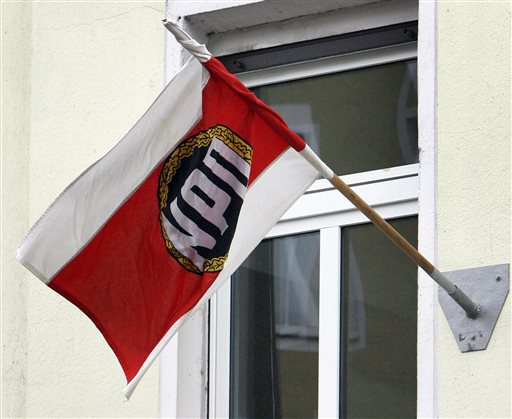BERLIN (AP) — Germany’s biggest far-right party, which once fueled fears of a neo-Nazi surge, is now in the doldrums.
While some other European countries are seeing a rise in the far right, National Democratic Party was last week booted out of parliament in Saxony, one of only two German states where it had lawmakers.
The resulting loss of some 2.5 million euros ($3.3 million) each year in public funding, which critics have said the NPD used to finance campaigns in other states, could crush a party that was regarded just a few years ago as a magnet for neo-Nazi sentiment in Germany and a threat to the country’s post-war reputation.
“This could be the beginning of the end for the party as a political force,” said Hendrik Traeger, a political scientist at Leipzig University. “Saxony was their stronghold.”
It was in the eastern German state that the NPD received 9.2 percent of the vote in 2004, shocking Germany’s political establishment and raising the specter of the country’s Nazi past.
The election gave the party 12 seats in the state parliament, a public platform to spread its ideas along with dozens of jobs for far-right activists.
Despite the money, the party had little impact in Saxony, according to Werner J. Patzelt, a political scientist at the Technical University Dresden.
“The NPD failed to fulfill any of the hopes its voters had, it didn’t have any credible representatives and skidded from one scandal to another,” Patzelt said.
Its former leader in Saxony once referred to Israel as a “Jewish criminal state,” party lawmakers refused to honor a minute’s silence for victims of the Holocaust, and one deputy calling for the use of hand grenades against “Zionists,” a common far-right synonym for Jews.
Apart from Mecklenburg-Western Pomerania, another eastern state, the NPD failed to emulate its success in Saxony anywhere. At the national level, the party hasn’t received more than 1.6 percent in the last decade — far less than the 5 percent needed to enter parliament.
Still, the NPD’s limited success was enough for other parties to seek a judicial review that could see it banned for pursuing unconstitutional aims. Germany’s domestic intelligence service has long warned that “the NPD aims to abolish the free democratic order” and its positions “show parallels to the programs of the original National Socialists.”
Meanwhile, the NPD’s decline in Saxony has been hastened by the rise of a new party, Alternative for Germany, which has attracted some socially conservative voters who previously voted for the far right by promising to restrict immigration and promote Christian family values.
Alternative for Germany received 9.7 percent in last week’s vote, taking more than 10,000 votes from the NPD. The far-right party fell 809 votes short of the 5 percent threshold as a result.
The NPD’s fate contrasts with that of other far-right movements in Europe. In France, the National Front received 26 percent of the vote in May’s European elections. In Greece, the extremist Golden Dawn party saw 18 lawmakers elected in 2012.
But unlike France and Greece, Germany is going through a period of economic prosperity.
“Back in 2004, the European Union had just opened its doors eastward and the jobless rate in Germany was significantly higher than today,” said Traeger. “This allowed the NPD to play on people’s fears and prejudices.”
Traeger expects the party to try to rebuild itself from the bottom up. It still has about 100 seats in local councils in Saxony, out of about 330 nationwide. Unlike other parties, the NPD didn’t hold its final election rally last week in one of Saxony’s major cities, but in the small town of Schneeberg, which has seen regular protests against the construction of a center for refugees. “The party clearly has deep roots at the local level,” said Traeger.
After losing all of its seats in Saxony, a senior member of Chancellor Angela Merkel’s conservative bloc said it was time to drop attempts to ban the party. The suggestion met with a swift rebuke.
“We mustn’t get lulled into a false sense of security,” said Germany’s minister for families, Manuela Schwesig, whose portfolio includes coordinating efforts to counter neo-Nazi activity.
Stephan Kramer, director of the American Jewish Committee’s European office, told Germany’s Handelsblatt newspaper that withdrawing the legal brief would send a fatal and wrong signal that the NPD and the organized far right aren’t a serious threat to our society and democracy.”
Aware that the fate of the party may hinge on its presence in Saxony, the NPD has already said it is considering asking for a recount.
“The NPD will use all available legal means to determine the real election result,” its leader in Saxony, Holger Szymanski, said shortly after the vote.

COMMENTS
Please let us know if you're having issues with commenting.